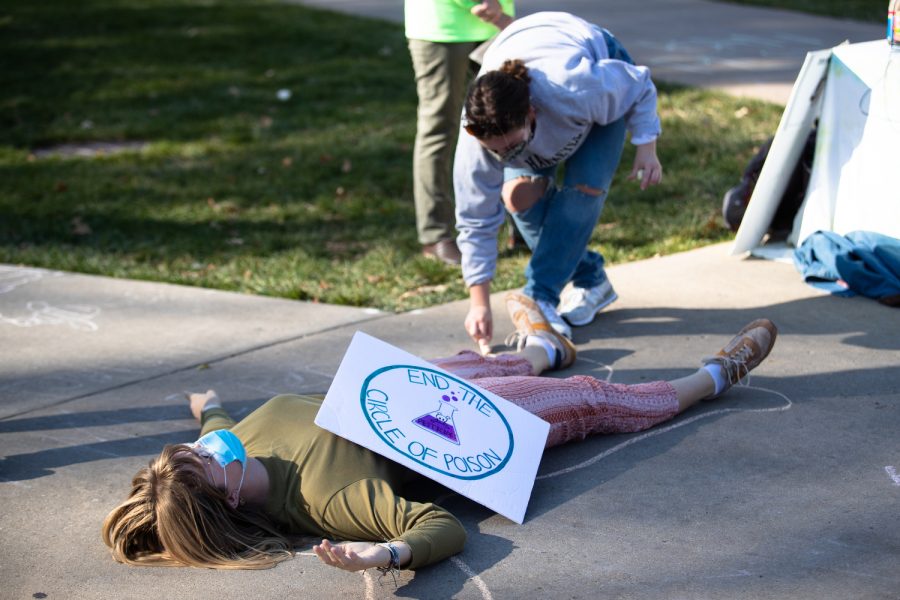University of Iowa Environmental Coalition protests UI’s use of pesticides
The University of Iowa Environmental Coalition held a protest against the UI’s use of pesticides on Tuesday Nov. 9. This comes after a report from the Office of Sustainability and the Environment, along with the Center for Health Effects of Environmental Contamination that many members found to be inadequate.
A protester outlines another protester at a protest against pesticides held by the University of Iowa Environmental Coalition at the Pentacrest at the University of Iowa on Tuesday, Nov. 9, 2021.
November 10, 2021
The University of Iowa Environmental Coalition held a protest against the UI’s use of pesticides on the pentacrest on Tuesday Nov. 9.
A gathering of between 20 and 30 demonstrators held up signs, gave speeches, and handed out fliers protesting the university’s use of pesticides.
Melanie Comer, an environmental planning major and co-president of the UI Environmental Coalition, said the protest was spurred by a report from the Office of Sustainability and the Environment, along with the Center for Health Effects of Environmental Contamination about the UI’s use of pesticides. Comer said the UI Environment Coalition had been demanding this report for 30 years, and when it was finally released, it fell short of the mark.
“We expected more clarity on the health effects [of pesticides] on people,” Comer said. “…They didn’t include any of that in the article. It was just basically what the pesticide is, where it’s sprayed. Sometimes they don’t even tell us where it’s sprayed.”
One pesticide applied on campus grounds, imidacloprid, is a neonicotinoid, an insecticide made to model nicotine. It is one of three neonicotinoids banned by the European Union for the harm it causes to pollinators. The insecticide is applied by contractor Quality Care, not Lanscaping Services.
In a statement to The Daily Iowan, Facilities Management Landscape Maintenance Supervisor Michael Weikamp wrote that a large majority of the campus is maintained through healthy turf practices, including mowing, aeration, and dethatching. Restricted use pesticides are not used anywhere on campus, he wrote.
“Areas managed by Facilities Management (FM) like the Pentacrest and other main campus areas, do not use 2-4D, insecticides or any neonicotinoids (associated with declining bee population) and have not for several years,” he wrote. “FM does not apply any products between the Iowa River walk areas and the riverbank. In addition, we have worked with several student organizations to install pollinator friendly gardens on campus to help attract and maintain a healthy bee population. We look forward to continued conversations with student organizations and campus stakeholders regarding our healthy turf practices. A number of departments and colleges have a stake in the appearance of the UI campus landscape. Any decision to change priority areas and turf management practices would need to be made within a shared governance context with input from across campus.”
Comer said the UI Environmental Coalition has been protesting the use of pesticides on campus for 30 years.
“We have constantly been telling the university to stop spraying,” Comer said, “… and they have done nothing but ignore us and leave us in the dust. So now it’s our time to speak up and tell the university and tell students and community members that this is a problem.”
Comer said that a possible alternative to the use of pesticides is manual landscaping, which is much better for the health of humans and the environment.
“It requires a little bit more work,” Comer said. “But we figured that the work that we do spraying pesticides could easily be replaced by manual landscaping, which would take probably about the same amount of time.”
RELATED: Environmental Coalition pushes for pesticide-free campus
Jake Burr, a fourth year art education major and co-president of the UI Environmental Coalition, said the pesticides being used on campus are known to cause cancer in humans and destroy biodiversity.
“It kills wildlife,” Burr said. “It kills plants. And it’s not good all around.”
Burr said while he would ideally prefer that the UI stop using pesticides altogether, he would like the university to start warning students when they do use pesticides.
“They got those tiny signs… They don’t do anything. You can’t see them, you can’t read them. There are people laying in the [lawns] right after they’re sprayed and it’s really bad for people.”
Andrew Dunn, a fourth-year political science major who is a Democrat running for the Iowa House in the 90th district, and member of the UI Environmental Coalition, said eradicating the use of pesticides can yield great benefits for both humans and the environment. Among these benefits, he lists higher quality soil, water, and human health.
Dunn added that the biggest risks from pesticides go to the applicators.
“The people that the university is hiring to apply these dangerous chemicals — they’re putting themselves at risk. And they’re also putting students at risk,” Dunn said. “And given the fact that they don’t really report the places where they’re applying these chemicals. You know, that’s something for serious concern.”
Dunn said he had a meeting with a member of the Iowa City government to discuss whether or not the city could do anything about the UI’s use of pesticides. He said while he received support, the city’s hands might be tied.
“We were actually discussing this, and they were saying, ‘if we [prohibited the UI’s use of pesticides], the Republican controlled state house would immediately take away our ability to do that, so it wouldn’t be meaningful.’”
The protection and conservation of bees was a major theme of the protest. Protesters carried signs that read, “Save the bees. Ban [neonicotinoids].” Or “A campus without bees is no place for me!”
Natalie Tapscott, a second year political science major, said her concern with pesticides revolves around the water supply.
She said with the river being directly down the hill, “All the pesticides they spray here just run directly into the water around Iowa City that the university uses.”
Lauren Haefs, a first year environmental policy major and member of the UI Environmental Coalition, said while immediately eradicating the use of all pesticides isn’t feasible there are alternative ways in which positive changes could be made.
“Making small steps and changing up the way that the policies work would really be helpful,” Haefs said. “[As would] increasing education and increasing the awareness among the student population and making them really want to act for change.”
Editor’s note: This article has been updated to include a statement from University of Iowa Facilities Management.















